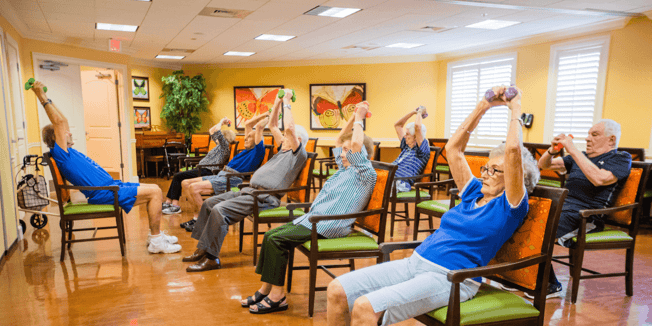Aided Living: a Compassionate Environment for Seniors With Memory Obstacles
Assisted living facilities progressively function as compassionate environments tailored to the special demands of seniors coming to grips with memory difficulties. By supplying personalized care and structured routines, these neighborhoods not just boost cognitive feature but also foster emotional connections, decreasing seclusion amongst homeowners. Specialized strategies, such as music therapy and reminiscence techniques, are employed by trained staff to promote much deeper communication. Nevertheless, the effectiveness of these interventions often hinges on the involvement of family members in the treatment procedure, motivating a better examination of how this collective initiative influences outcomes for both homeowners and liked ones.
Understanding Memory Obstacles
Comprehending memory challenges is essential for giving efficient like elders facing cognitive decrease. Memory problems, which can show up as forgetfulness, complication, or difficulty remembering recent occasions, are typically symptoms of conditions such as Alzheimer's disease or other forms of dementia. These difficulties can significantly influence an elderly's capacity to execute day-to-day tasks, preserve social connections, and take care of personal safety.
Acknowledging the different phases of cognitive decrease is crucial for caregivers and health care experts. Early-stage amnesia might entail moderate lapse of memory, while mid-stage decrease can result in more pronounced disorientation and confusion. In late-stage dementia, individuals might shed the capacity to connect effectively, requiring extensive support and understanding from caregivers.
Additionally, memory obstacles can stimulate a variety of emotional responses, consisting of irritation, anxiousness, and clinical depression. This demands a thoughtful approach to care that focuses on the emotional well-being of the person. Recognizing the intricacies of memory difficulties allows caregivers to create customized strategies that boost communication, promote engagement, and give a complacency. Ultimately, a deep understanding of these difficulties is essential to providing thoughtful and efficient look after elders encountering cognitive decrease.
Benefits of Assisted Living
Aided living offers numerous benefits for elders with memory obstacles, providing a supportive atmosphere that cultivates independence while making sure safety and security and care. Among the key advantages is the day-and-night supervision and support available, which aids alleviate dangers associated with memory-related issues. Memory Care. This continuous support permits senior citizens to participate in day-to-day activities without the fear of crashes or complication
Additionally, aided living centers typically provide organized routines that can enhance cognitive feature and stability. These routines assist locals really feel even more secure and minimize stress and anxiety, as they understand what to expect every day. Social interaction is one more significant advantage, as these atmospheres urge connections amongst residents, advertising emotional well-being and lowering sensations of seclusion.
Moreover, helped living team are trained to identify the special needs of elders with memory challenges, permitting customized care strategies that deal with specific preferences and needs. This customized approach not only enhances the high quality of care however likewise equips elders to preserve a feeling of freedom. Overall, assisted living serves as a compassionate service, balancing the requirement for support with the desire for self-reliance in the lives of seniors dealing with memory obstacles.
Specialized Care Approaches
Executing specialized treatment strategies is necessary for efficiently sustaining elders with memory obstacles. These tailored approaches concentrate on boosting the high quality of life and fostering self-reliance while attending to the one-of-a-kind demands of people with cognitive impairments. One fundamental method is person-centered care, which stresses the relevance of comprehending each local's life history, choices, and values. By tailoring care strategies appropriately, personnel can produce a much more appealing and significant atmosphere.
Another critical approach includes using cognitive stimulation therapies. Activities made to boost memory recall, encourage social communication, and promote psychological agility can significantly influence homeowners' overall wellness. Strategies such as reminiscence treatment leverage personal memories to trigger conversation and link, while music treatment can evoke emotions and memories, providing comfort.

Developing a Supportive Neighborhood
(Dementia Care Charlotte)A supportive community plays a crucial duty in improving the lives of seniors with memory difficulties. Such an area fosters an atmosphere of understanding, compassion, and motivation, which is essential for individuals dealing with cognitive troubles. By creating a network of assistance, aided living facilities can substantially boost the lifestyle for residents.
Central to a helpful area is the presence of qualified team that are sensitive to the distinct requirements of elders with memory impairments. These professionals not just give essential care however additionally involve homeowners in meaningful activities that boost cognitive feature and advertise social communication. Programs that encourage involvement in team workouts, arts and crafts, or memory video games can boost both physical and mental wellness.
Additionally, a helpful area advertises solid connections among locals. Motivating relationships and peer assistance assists to minimize sensations of seclusion and cultivates a feeling of belonging. Normal gatherings and public dining experiences can additionally reinforce these bonds, developing an ambience where senior citizens really feel valued and understood.
Involving Families in Care
Involving family members in the treatment procedure is necessary for offering extensive support to seniors with memory obstacles. Relative commonly offer as crucial advocates, offering insights right into the person's preferences, history, and routines that can boost tailored treatment. By including them in discussions and care preparation, aided living facilities can create an extra alternative approach that reverberates with the local's needs.

Urging families to take part in care not only boosts the well-being of the elderly yet also supplies emotional support to household participants. Including families in care cultivates a sense of neighborhood and belonging, making certain that seniors feel connected to their loved ones. Eventually, a collective technique to care improves the lives of both residents and their households, developing a thoughtful and supportive atmosphere that advertises self-respect and regard.
Conclusion
In final thought, assisted living acts as a vital resource for seniors experiencing memory obstacles, offering personalized treatment customized to specific demands. The organized routines Memory Care Facilities Charlotte and interesting activities promote cognitive feature and emotional health, promoting a feeling of belonging. Specialized treatment methods, such as reminiscence and songs treatment, improve communication and link. By involving families in the care process, helped living produces a detailed assistance network, inevitably improving the lives of homeowners and their enjoyed ones.